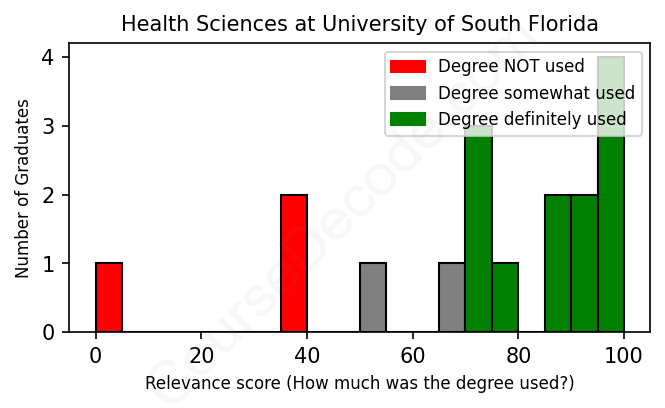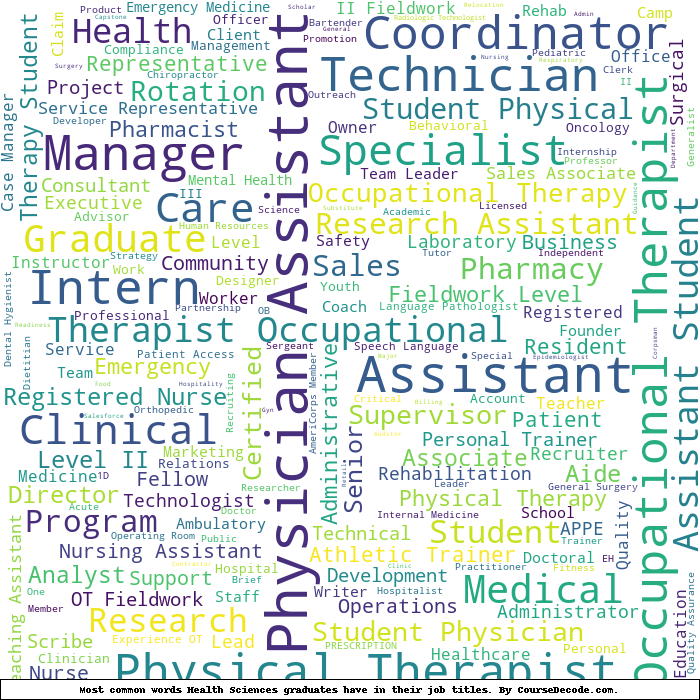
First, some facts. Of the Health Sciences graduates from University of South Florida we've analyzed , here's how many have used (or NOT used) their degree in their career:

These are estimates based on AI analysis of 17 LinkedIn profiles (see below).
The verdict? Slightly above average. Overall, with an average relevance score of 72%, Health Sciences graduates from University of South Florida have a slightly higher likelihood (+5%) of finding work in this field compared to the average graduate across all fields:
And for comparison, here's the chart for all profiles we've looked at across all degrees.
Also, after graduating, 70% of these graduates have pursued further education other than another Bachelor's degree (such as a Masters degree or other), compared to the average across all profiles of 35%. This suggests you may need more than just a Bachelors degree to be competitive as a Health Sciences graduate.
See the details:
|
Relevance score: 74% We think this person has gone into a career highly relevant to their degree. We think this person has gone into a career highly relevant to their degree.
DEGREE INFOGraduated in 2015 from University of South Florida with a Bachelor of Science (B.S.) in Health Sciences. Also pursued further education since (see below). JOB HISTORY SINCE GRADUATIONChief Medical Scribe ScribeAmerica Feb 2015 - Nov 2015 Pharmacy Technician  CVS Health Nov 2015 - Nov 2016 Monitor Support Technician  UF Health Nov 2015 - Nov 2016 Pharmacy Technician  UF Health Nov 2016 - Jul 2018 APPE: Hospital Practice  UF Health May 2021 - Jun 2021 APPE: Neonatal Intensive Care Unit  UF Health Jun 2021 - Jul 2021 APPE: General Medicine  UF Health Aug 2021 - Sep 2021 APPE: Ambulatory Care  UF Health Sep 2021 - Oct 2021 APPE: Community Practice  UF Health Oct 2021 - Dec 2021 APPE: Infectious Diseases  UF Health Jan 2022 - Feb 2022 APPE: Trauma Critical Care  UF Health Mar 2022 - May 2022 Pharmacy Resident  WakeMed Jun 2022 - Jun 2023 Clinical Pharmacist  Duke Raleigh Hospital Jul 2023 - Present FURTHER DEGREES DONE SINCE GRADUATINGDoctor of Pharmacy - PharmDUniversity of Florida 2018 - 2022 ABOUTNo information provided. |
The top 10 most common jobs done by the graduates we've analyzed (ranked most common to least) are:
From looking at the jobs held by graduates with a degree in Health Sciences from the University of South Florida, it's clear that many have stepped into roles that align pretty well with their field. A significant number of graduates have taken positions like Pharmacy Technicians, Medical Assistants, and Physical Therapists, which all require applying health-related knowledge directly. These roles often involve patient care and a sound understanding of medications, anatomy, and healthcare practices—things that are at the core of what Health Sciences is all about. Positions at healthcare institutions like CVS Health, Moffitt Cancer Center, and AdventHealth showcase this trend of direct application of their education.
On the flip side, there are also graduates who ventured into jobs that are somewhat disconnected from health science principles. Roles like Administrative Assistant, Sales Associate, or even positions in business consulting are examples where the relevance of a Health Sciences degree is minimal. While these graduates may still use some general skills developed during their studies, they aren't necessarily operating in the health field day-to-day. So, while many graduates found rewarding careers that utilize their Health Sciences training, others have veered off into paths where their degree might not be critical. Overall, it seems like there's a solid mix of job relevance based on the various career choices made by these individuals.
Here is a visual representation of the most common words in job titles for Health Sciences graduates (this is across all Health Sciences graduates we've analyzed, not just those who went to University of South Florida):

Looking at the career trajectories of graduates from the University of South Florida with degrees in Health Sciences, it's clear that many folks start off in entry-level roles related to healthcare. For instance, right after graduation, you’ll often see them taking jobs as pharmacy technicians, medical assistants, or administrative roles in healthcare settings. These positions make sense since they give new grads a foot in the door and valuable experience in the industry. It’s common for them to work in these support roles for a couple of years before they either advance within those organizations or pivot into other healthcare specialties.
As we look five to ten years down the line, many graduates find themselves in more specialized, higher-responsibility positions. We see individuals moving into roles like registered nurses, physical therapists, clinical pharmacists, and even leadership positions within healthcare facilities. However, it's worth noting that not every graduate sticks closely to the health sciences field; some end up in roles that, while somewhat connected, diverge significantly from a traditional health sciences path. Overall, it appears that a solid number of graduates are able to leverage their degrees into successful health-related careers, but there remains a segment who may find themselves in positions that aren't directly tied to their studies in the long run. It's definitely a mixed bag, but many graduates seem to find a way to stick to the health sciences in some capacity.
Getting a Bachelor’s degree in Health Sciences can be a mixed bag, depending on how prepared you are for college-level coursework. At the University of South Florida, like many other schools, the program covers a lot of ground—think biology, anatomy, health policy, and more—which can feel pretty demanding at times. It’s definitely not the easiest degree out there; you’ll need to be ready to hit the books and engage in some heavy lifting with scientific concepts. That said, if you’re passionate about health and willing to put in the work, it can be a rewarding experience. Just remember to strike a balance between study and chill time, and you’ll be just fine!
Most commonly, in the LinkedIn profiles we've looked at, it takes people 3 years to finish a Bachelor degree in Health Sciences.
Looking at the job sequences for these Health Sciences grads from the University of South Florida, it seems like some of them have managed to find decent-paying positions, especially those who landed roles in healthcare settings like hospitals and pharmacies. For instance, the folks transitioning into roles like clinical pharmacists, medical laboratory technologists, and occupational therapists typically see salaries that can be quite respectable. Others, however, started off with lower-paying positions like administrative assistants or retail roles, which may have kept their earnings at a more modest level initially. Over time, many have moved into better-paying positions, so it seems like with experience, they’re likely doing pretty well now. Overall, while entry-level jobs might not have paid much, they slowly built their careers into something more lucrative.
Here is a visual representation of the most common words seen in the "about" section of LinkedIn profiles who have a Bachelor degree in Health Sciences (this is across all Health Sciences graduates we've analyzed, not just those who went to University of South Florida). This may or may not be useful:

Here are all colleges offering a Bachelor degree in Health Sciences (ordered by the average relevance score of their Health Sciences graduates, best to worst) where we have analyzed at least 10 of their graduates:
| College | Score | Count |
|---|---|---|
 James Madison University James Madison University
|
83 | 13 |
 University of South Florida University of South Florida
|
72 | 17 |
 University of Central Florida University of Central Florida
|
57 | 12 |